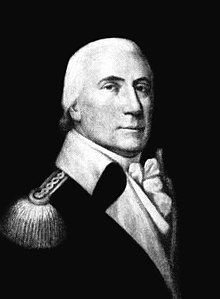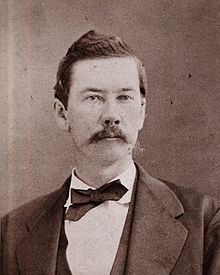President pro tempore of the North Carolina Senate
| President pro tempore of the North Carolina Senate | |
|---|---|
 Senate Chambers | |
| North Carolina Senate | |
| Status | Presiding officer |
| Seat | North Carolina State Legislative Building, Raleigh, North Carolina |
| Nominator | Major parties (normally) |
| Appointer | The North Carolina Senate |
| Term length | two years (currently) |
| Constituting instrument | North Carolina Constitution |
| Formation | 1777 |
| First holder | Samuel Ashe |
The President pro tempore of the North Carolina Senate (more commonly, "Pro-Tem") is the highest-ranking (internally elected) officer of one house of the North Carolina General Assembly. The President of the Senate is the Lieutenant Governor of North Carolina, but the President pro tempore actually holds most of the power and presides in the absence of the Lt. Governor. He or she, a senior member of the party with a majority of seats, appoints senators to committees and also appoints certain members of state boards and commissions. From 1777 to 1868, North Carolina had no Lieutenant Governor, and the highest-ranking officer of the Senate was known as the "Speaker". The Speaker of the Senate was next in line if the office of Governor became vacant. This occurred on two occasions.
Presidents pro tempore are elected at the beginning of each biennial session, currently in January of odd-numbered years. Between 1868 and 1992, it was rare for a President pro tempore to serve more than two terms. Marc Basnight, however, became arguably the most powerful North Carolina Senate leader in history and one of the state's most influential politicians when he served a record nearly 18 years as President pro tempore.
North Carolina Senate presiding officers[]
Speakers[]



The following members were elected speakers of the Senate:[1][2][3][4]
- Samuel Ashe 1777
- Whitmell Hill 1778
- Allen Jones 1778–1779
- Abner Nash 1779–1780
- Alexander Martin 1780–1782
- Richard Caswell 1782–1784
- Alexander Martin 1785
- James Coor 1786–1787[5]
- Alexander Martin 1787–1788
- Richard Caswell 1789
- Charles Johnson 1789
- William Lenoir 1790–1795
- Benjamin Smith 1795–1799
- Joseph Riddick 1800–1804
- Alexander Martin 1805
- Joseph Riddick 1806–1811
- George Outlaw 1812–1814
- John Branch 1815–1817
- Bartlett Yancey 1817–1828
- Jesse Speight 1828–1829
- Bedford Brown 1829–1830
- 1830–1832[6]
- William D. Moseley 1832–1835
- (Whig) 1836–1837 [7][8]
- 1838–1841[9]
- Louis Dicken Wilson 1842–1843[10]
- Burgess S. Gaither 1844–1845
- 1846–1847[9]
- Calvin Graves 1848–1849[11]
- 1849[9]
- Weldon N. Edwards 1850–1852
- Warren Winslow 1854–1855
- William Waightstill Avery 1856–1857
- Henry Toole Clark 1858–1861
- Giles Mebane 1862–1865
- Thomas Settle 1865–1866
- 1866
- Matthias Manly 1866
- Joseph Harvey Wilson 1867
Presidents pro tempore[]

The following members were elected President pro tempore of the Senate:[1][2][4][12]
- 1868–1869[12]
- (D) 1870–1872[13]
- 1872–1875 [14][15]
- James L. Robinson (D) 1876–1877
- William A. Graham (D) 1879–1880
- William T. Dortch (D) 1881–1883
- Edwin T. Boykin 1885–1887
- (D)[16] 1889
- W. D. Turner (D) 1891
- 1893
- (P) 1895–1897[17]
- (D) 1899–1900
- (D) 1899—1900
- (D) 1901–1903
- (D) 1905–1908
- (D) 1909
- Henry N. Pharr (D) 1911–1913
- Oliver Max Gardner (D) 1915
- (D) 1917
- Lindsay C. Warren (D) 1919–1920
- (D) 1921–1924
- (D) 1925
- (D) 1927
- (D) 1929
- (D) 1931
- William G. Clark (D) 1933
- (D) 1935
- (D) 1937–1938
- (D) 1937–1938
- (D) 1939
- John Davis Larkins Jr. (D) 1941
- (D) 1943
- (D) 1945
- (D) 1947
- (D) 1949
- (D) 1951
- (D) 1953
- (D) 1955–1956
- (D) 1957
- (D) 1959
- (D) 1961
- Ralph H. Scott (D) 1963 [18]
- Robert B. Morgan (D) 1965–1966
- (D) 1967
- (D) 1969
- Frank N. Patterson Jr. (D) 1971
- Gordon P. Allen (D) 1971–1974
- John T. Henley (D) 1975–1978
- W. Craig Lawing (D) 1979–1984
- J. J. Harrington (D) 1985–1988
- Henson P. Barnes (D) 1989–1992
- Marc Basnight (D) 1993–2010
- Phil Berger (R) 2011–present
See also[]
- Speaker of the North Carolina House of Representatives
References[]
- ^ Jump up to: a b Connor, R. D. D. (1913). A Manual of North Carolina (PDF). Raleigh: North Carolina Historical Commission. pp. 453–. Retrieved April 27, 2019., Alternate link
- ^ Jump up to: a b Wheeler, John H. (1874). "The Legislative Manual and Political Register of the State of North Carolina". Retrieved April 9, 2019.
- ^ "Session Laws: North Carolina". HeinOnline. New York: William S. Hein & Co., Inc. Retrieved March 22, 2019. (subscription required)
- ^ Jump up to: a b Lewis, J. D. "NC Revolution State House 1780". The American Revolution in North Carolina. Retrieved April 27, 2019.
- ^ Carraway, Gertrude (1979). "James Coor". NCPedia. Retrieved October 3, 2019.
- ^ Robinson, Blackwell P. (1979). "David Caldwell". NCPedia. Retrieved Oct 3, 2019.
- ^ Keating, Mary R. (1996). "Hugh Waddell". NCPedia. Retrieved September 23, 2019.
- ^ "North Carolina portrait index, 1700-1860". NCDCR.gov. 1963. p. 234.
- ^ Jump up to: a b c Murphy, Eva (1988). "Andrew Joyner". NCPedia. Retrieved October 3, 2019.
- ^ Johnston, Hugh Buckner (1996). "Louis Dicken Wilson". NCPedia. Retrieved October 3, 2019.
- ^ Humber, John L. (1986). "Calvin Graves". NCPedia. Retrieved October 3, 2019.
- ^ Jump up to: a b Cheney, John L. Jr. (1974). North Carolina Government, 1585–1974. pp. 447–448.
- ^ Alexander, Roberta Sue (1996). "Edward Jenner Warren". NCPedia. Retrieved October 3, 2019.
- ^ was at some point elected President pro tempore but then immediately became President of the Senate due to the vacancy in the office that resulted when Lt. Gov. Curtis Hooks Brogden succeeded to the governorship. (see NC Manual of 1913, p. 476, where Armfield is listed as president of the Senate)
- ^ Powell, William S. (1991). "James Turner Morehead, Jr". Retrieved October 3, 2019.
- ^ Hunt, James L. "The Making of a Populist: Marion Butler, 1863-1895: Part I." The North Carolina Historical Review, vol. 62, no. 1, 1985, pp. 53–77. "Butler vigorously attacked Kerr and other conservative Democrats."
- ^ Biographical Sketches of the members of the General Assembly, 1895
- ^ was elected President pro tempore when the 1963 legislature convened, but since President of the Senate (Lt. Governor) Harvey Cloyd Philpott had died, Stone immediately became President of the Senate. The Senate then elected Scott as President pro tem. (News & Observer blog comment by state legislative drafting director Gerry Cohen)
- North Carolina Senate
- Lists of North Carolina politicians
- Political history of North Carolina
